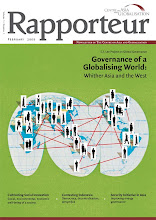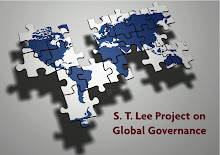Imagine the global contest for leadership as a battlefield. The front lines aren't just military and economic: Ideas are at least as crucial. And in this struggle, openness and transparency are growing ever more important. The United States, which once had an enormous advantage in terms of transparency, lost its position during the Bush-era rollback of civil liberties. Meanwhile, two surprising contenders have entered the lists.
The first is India. India's rambunctious, sprawling democracy has long been highly secretive, in keeping with colonial British traditions. But this started to change in the early 1990s, when grass-roots groups began demanding access to documents held by local governments. Day laborers, who are often left un- or undercompensated for government projects, demanded to know who else was getting paid, and how much. Villagers wanted to know why their schools remained unfinished. The movement spread rapidly, based on the notion that transparency was essential not just to liberty but to survival.
By 2005, this nationwide grass-roots campaign led to one of the world's most sweeping right-to-know laws. Indeed, the Indian Right to Information (RTI) Act is proving to be a muscular instrument for empowering citizens vis-à-vis India's notoriously ponderous bureaucracy. When police can't be bothered to accept a complaint about a theft, citizens can file RTI applications to find out why not, which often prompts the police to do what they should have done in the first place. Public works contractors must publish their contracts at their work sites, allowing local citizens to measure how work is going. The government and nongovernmental organizations have launched evaluations of the act's impacts, both still underway. But already campaigners are finding that some two thirds of focus group participants said that greater access to information would help solve many of their problems.
The far more surprising second contender is China. Conventional wisdom in the West portrays China as authoritarian, secretive, and rigid. Yet in 2008, China's State Council proactively established a set of nationwide open government information regulations. Now, via gazettes and Web sites, the government discloses an increasing array of statistics and details about health, education, budgets, economic programs, and urban planning. The same regulations allow citizens to request the release of information from the government.
This move, drawn from several years of experiments with transparency and accountability at local levels, represents a major political shift. China's system, traditionally dominated by secrecy and the rationing of information, is increasingly premised on openness and public scrutiny. One year in, the regulations are actively being used by citizens addressing grievances in land requisition, by environmental groups monitoring corporate standards, and by lawyers and public intellectuals scrutinizing everything from government toll collection to budget spending.
The sea change is likely due to strategic party calculations, rather than an embrace of democratic principles. Indeed, the Chinese Communist Party has found that secrecy can cripple its own efforts to foster growth and stability in a globalized world. For instance, China needed to improve its economic transparency to join the World Trade Organization. The global health and economic damage brought by the 2003 SARS outbreak and 2008 melamine poisoning scandal further spurred the government to become more open and stamp out malfeasance within its system.
The calculations are also domestic. China has to deal with official corruption that is not only endemic, but spreading. Its citizenry is increasingly informed, networked, and assertive. With pressures on these multiple fronts intensifying, the leadership has come to recognize that it must build in checks to its own administrative power if the country is to enjoy the economic growth and political stability upon which the party's continued dominance depends.
Thus, the contours of a new global contest are emerging. Western countries no longer have a monopoly over the definition and value of openness and disclosure. India's grass-roots approach champions transparency as a critical means of empowering the poor. China's state-driven approach wields transparency fundamentally as an alternative (rather than a prerequisite) to democratic reform. If the United States and other Western countries want to avoid losing the battle, they'll pay close attention to developments in these two countries. [AF & YT]
This article, titled "Transparent warriors" was first published in FOREIGN POLICY.










No comments:
Post a Comment